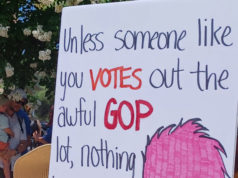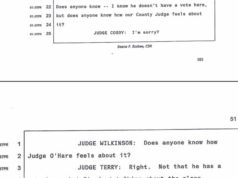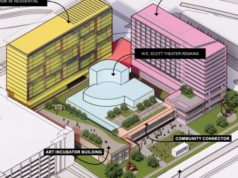Dallas doesn’t generally follow in Cowtown’s hoofprints. When it comes to gas drilling, the city’s Plan Commission was smart enough to look our way — where it saw a stinking, poisonous mess and looked away again. Rather than allowing gas companies to run roughshod, Dallas has set the stage for what might — with one major exception — be an intelligent way to allow people to make money off their mineral rights while keeping the city from turning into another Smelly Old Town.
On Sept. 26, by a resounding 14-1 vote, the commission signed off on a proposed gas drilling ordinance that, if passed by the Dallas City Council, will make drillers set their well sites back 1,500 feet from homes and other protected uses. They can reduce that to 1,000 feet in special cases, but only with the agreement of 12 of 15 council members and only after drillers have held neighborhood meetings on why they need the shorter setback.
Drillers will also need to use electric motors in all phases of operation. If they want to use loud, often-leaky combustion engines, they’ll have to explain why electric isn’t feasible. Compressor stations will have to be fully enclosed and will be allowed only in heavy industrial districts. No waste pits or injection wells will be allowed in the city; road repair agreements will be signed before any work on a well can begin; baseline testing of water, air, soil, and noise will be done at every well site before drilling can start; and the kicker is that every chemical used in fracking fluids must be tagged with a chemical signature — no exceptions — so that when those chemicals show up where they don’t belong, it will be easier to name the culprit.
Wow. Can this truly be happening only one county away from Fort Worth, where the law for drillers is “Do as You Please to All of Us”?
The biggest hole in the proposed Dallas ordinance, according to Jim Schermbeck of Downwinders At Risk, deals with drilling near recreation areas that are normally protected. The proposed ordinance says “protected use” includes recreation areas “except when the operation site is on a public park, playground, or golf course.” As Schermbeck said, “Then it’s perfectly fine to have a rig next to the swing set.”
The ordinance would also allow for drilling in floodplains as long as the entire drilling pad is elevated by fill above a certain flood level and approved by the Army Corps of Engineers. Good luck with that when it rains for five days.
There is no timeframe for when the Dallas City Council will move on the proposed ordinance, but if they are willing to lock in most of it, they’ll wind up way ahead of Fort Worth, Where the West Begins (to smell like toxic gas).
Abortion Fight Goes On
Texas is once again front and center in the controversial issue of women’s reproductive healthcare. A federal lawsuit filed on Sept. 27 by a coalition of groups aims to strike down two key provisions of the state’s recently enacted and highly controversial abortion law. House Bill 2 creates sweeping restrictions on when and how abortions can be performed, including a ban on abortions after 20 weeks of pregnancy and restrictions on abortion medications.
The Planned Parenthood Federation of America, American Civil Liberties Union, and other organizations filed the suit. Planned Parenthood spokeswoman Natalie Kelinske said the law does “nothing to improve medical care for women” and that one third of abortion-providing clinics will close due to provisions in the law.
“The majority of Texans are pro-life,” said Emily Horne, director of Texas Right to Life, the state’s largest anti-abortion organization. “This isn’t an issue of [limiting] access. It’s about new rules.”
Despite passage of the legislation, State Sen. Wendy Davis’s nationally covered filibuster against the measure and now the new lawsuit are giving some abortion rights supporters renewed hope.
“Texans are showing America that they support women’s rights,” said Kelinske. “This law makes an already terrible situation for women even worse.”












